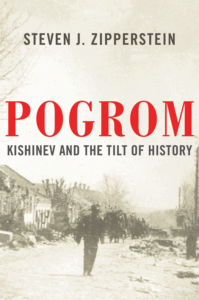Reviewed by NEAL GENDLER
The notorious Kishinev pogrom of 1903 was one of many in Czarist and early Bolshevik Russia and not even the deadliest, but the thunderous reaction to it lingers to this day in ways as diverse as Israel’s army and the NAACP.

“Prior to Buchenwald and Auschwitz, no place-name evoked Jewish suffering more starkly than Kishinev,” says Steven Zipperstein in Pogrom: Kishinev and the Tilt of History.
“Kishinev’s pogrom may well be the best known of all moments in the Russian Jewish past and the one most persistently, lavishly misunderstood,” he says. “It was a moment that cast a shadow so deep, wide and variegated as to leave its imprint on Jews, on Jew haters and on wounds licked ever since.”
Zipperstein, professor of Jewish culture and history at Stanford University, analyzes the pogrom’s causes and consequences, and relates it to the Protocols of the Elders of Zion forgery that continues its libel around the world.
A city of nearly 110,000 in Bessarabia, now independent Moldova, Kishinev “had barely been touched” in the 1881-1882 wave of pogroms, he says. Kishinev’s Jews and majority Moldovans generally got along. “The only new, toxic ingredient in this otherwise benign mix” was Pavel Krushevan’s newspaper, Bessarabets, “one of the empire’s most outspokenly anti-Jewish periodicals.”
The pogrom began in April, Easter afternoon. More than two days of murder, beatings, rapes and destruction left 49 dead, hundreds hurt, businesses and homes looted.
Unlike others, this pogrom became known quickly and widely thanks to telegrams sent after the pogrom’s second night. “It dominated the headlines of American newspapers for weeks,” Zipperstein says. The Hearst newspapers covered it heavily, with photos of the dead and detailed reporting by Michael Davitt. Then Chaim Nachman Bialik rolled voluminous interviews and observations into a gruesome 400-line poem, “In the City of Slaughter,” lashing Kishinev’s Jewish men for cowardice.
“Davitt and Bialik had been dispatched to Kishinev to amass data,” Zipperstein says. “Bialik’s decision to scuttle the task and write his poem would come somewhat later. Both managed to distill the catastrophe in ways all the more enduring because their accounts were so precise and concrete.” To both, the single most disturbing feature was “the cowardice of Kishinev’s Jewish males … Davitt excised all mention of it in his published work. Bialik situated it at the heart of his poem.”
Although Zionist-leaning Bialik had testimony of Jewish resistance, he left it out, Zipperstein says.
In May, the London Times printed a purported letter from Russian Interior Minister V. K. Plehve foretelling the pogrom and instructing Kishinev officials not to squelch it with force. The letter, almost certainly a forgery, “would soon fixate so much of the world’s press on Kishinev” and solidify the idea that Jews had no future in Russia, Zipperstein says.
Bialik’s poem “soon became shorthand for the utter vulnerability of the Jewish people, their devastation of body and soul alike,” Zipperstein says. It helped form the mindset for Israel’s pre-state self-defense force, Hagana.
Great outcry in America also led leftists to relate the slaughter of Russian Jews to the lynching of American blacks. Such emphasis by Russia experts William English Walling and Anna Strunsky led to founding of what would become the National Association for the Advancement of Colored People in their New York apartment in 1909.
Zipperstein attributes The Protocols, often considered a czarist secret-police forgery, to Krushevan. His version, more than 70 percent copied from Maurice Joly’s 1864 political satire against Napoleon III, was published in his St. Petersburg newspaper Znamia in summer 1903.
All this is a lot for 208 pages. Only 24 cover the pogrom directly, and we get just a few lines of Bialik’s poem. Not for the faint-hearted, it can be found on line.
Crammed with information, Pogrom is short but not brief, requiring considerable attention to clause-filled sentences. Its eye-opening enlightenment is augmented by maps, photos and index.
Zipperstein says: “Kishinev, barely known beyond its immediate region before the pogrom, would quickly become the inspiration for some of the most powerful — and resilient — metaphors in Jewish life.”
***
Neal Gendler is a Minneapolis writer and editor.
(American Jewish World, 3.23.18)



















